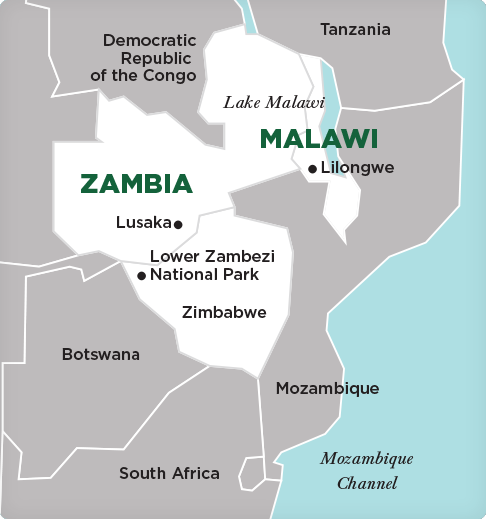Credits
16
Prerequisites
None
Language of Study
Chichewa
Courses taught in
English
Dates
Jan 27 – May 11
Program Countries
Malawi
Program Excursion Countries
Zambia
Program Base
Lilongwe
Critical Global Issue of Study
Development & Inequality

Explore decolonial approaches to the field of development through case studies and collaborative research projects.
16
None
Chichewa
English
Jan 27 – May 11
Malawi
Zambia
Lilongwe
Development & Inequality
Malawi is increasingly becoming known for innovative subsistence and sustainable agricultural practices. However, many Malawians still struggle to access basic healthcare, clean water, and educational opportunities. In recent years, heavy rainfalls and cyclones, both impacts of climate change, are also affecting the country’s natural resources and straining its agricultural practices and systems. Malawians are redefining their lives to provide for their families and communities as they apply novel technologies drawn from Indigenous knowledges, sometimes beyond the gaze of development policymakers and practitioners.
In urban and rural settings and during a comparative excursion to Zambia, you will learn about development projects spearheaded by communities and learn about decolonial theory in the context of a complex hierarchical structure of chieftaincy, which both complicates and augments inclusive approaches to development. Through hands-on research, you will consider possibilities for decolonizing development and build your own inclusive approach based on the tenets of social justice and equitable access to resources.
Develop the knowledge and skillset for careers with organizations like the UN, USAID, and Peace Corps, as well as grassroots and community-based organizations. Through case studies with development projects focused on education, urban infrastructure, access to clean water, public health, agriculture, and food systems, this program is suitable for students coming from a wide variety of majors.
None


During an excursion to Zambia, compare how Malawi and Zambia have taken different paths towards development, influenced by the natural resources, cultural traditions, and colonial histories of each nation. Your trip begins in Lusaka, Zambia’s capital, one of the fastest developing cities in southern Africa, and a hub for international development organizations. On your way back to Malawi, stop for a safari in Lower Zambezi National Park to search for elephants, lions, cheetahs, and zebras and to learn about the continued rise of the tourism industry in Southeast Africa and its implications for development.
A road trip out of Lilongwe will take you first to the shores of Lake Malawi to learn about the fishing industry as well as emerging large-scale development projects focused on irrigation and clean water access. Next, travel south to rural communities near Ntcheu and visit subsistence farming families to learn how cultural traditions, climate change, migration, and international aid regimes have influenced rural Malawians past, present, and future.
Please note that SIT will make every effort to maintain its programs as described. To respond to emergent situations, however, SIT may have to change or cancel programs.
Upon successful completion of the program, students will be able to:
The following syllabi are representative of this program. Because courses develop and change over time to take advantage of dynamic learning opportunities, actual course content will vary from term to term.
The syllabi can be useful for students, faculty, and study abroad offices in assessing credit transfer. Read more about credit transfer.
Decolonial Approaches to Development – syllabus
(SDIS3000 / 3 credits)
This course examines the critiques emerging from the Global South of Western Eurocentric epistemologies that have been, and continue to be, the foundation for development practice today. The course seeks to recenter the perspective of indigenous epistemologies and voices of local communities from beyond the lens of western knowledge and mainstream development agencies. It engages students experientially from bottom-up, constantly centering self-reflexive approaches of learning in ways that raise critical questions and open spaces for reframing issues such as sustainability, growth, and poverty.
Each module opens with a review of mainstream perspectives on the key issues to be engaged in the module. Carefully prepared excursions, short trips, and site visits that engage diverse alternative epistemologies and perspectives follow. The goal is to critically examine the limits of Western/Eurocentric frames in prompting human dignity and social justice in countries such as Malawi.
Inclusive Development Practice in Southeast Africa – syllabus
(SDIS3500 / 3 credits)
This course centers socioeconomic class, gender and sexual identity, and place of residence in national and local development policy formulation, implementation, and its outcomes, comparatively, in Malawi and Zambia. How does development practice and the practice of development generate social inequality? What can be done to eliminate or mitigate skewed livelihood outcomes in countries such as Malawi and Zambia? What policies can be implemented to enhance equitable development outcomes for women, youth, the elderly, and rural residents? This course delves deeper into trends and patterns across space, class, and time, in the key sectors of development, and the policies and projects through which inequality could be eliminated or mitigated.
Chichewa Language Study – syllabus
(3 credits)
This course aims to provide you with basic communication skills in the language of Chichewa, focusing on communicative language abilities. Language is best studied alongside analysis of the cultural context, and as such, this course will serve as a gateway for your entrance into and exploration of Malawian society. Emphasis is on basic conversation and cultural cues with practical relevance to your stay in Malawi. As such, language skills needed in “real world” situations are emphasized, like shopping at the local market, transportation, greetings, speaking about oneself, and asking questions.
Research Methods and Ethics – syllabus
(ANTH3500 / 3 credits)
This course equips students with the knowledge and skills for conducting research ethically and successfully in contexts such as Malawi. Beyond the research methods, this course draws on decolonial perspectives to open possibilities for students to consider a wider array of social research questions and methods. Research questions that students frame and research methods they choose to employ will be shaped and informed by the cultural and socio-political context of the chosen research context. The course builds into the learner a critical perspective but also empowers the learner to make decisions that are sensitive to the rights of research subjects.
Independent Study Project in Development Practice – syllabus
(ISPR3000 / 4 credits)
The Independent Study Project (ISP) is an academic project that is designed to provide students the opportunity to deepen their understanding of decolonial approaches to sustainable development in Malawi. A central aspect of the ISP is the collection and use of primary data. The ISP does not involve extensive library research that could be done in the United States, but rather takes advantage of the student’s presence in Malawi with access to materials and information sources available on-site. A local advisor, who specializes in the student’s particular field of interest, is designated for the student by the academic director (AD). All topics must be finalized and approved by the AD, and advisors must be selected and confirmed before the project commences.
As part of the RME course, meetings will be held throughout the semester with the AD and academic tutors of the program to finalize the topic, select an appropriate advisor, define a clear topic and a research question, and identify potential sources of information. Allowing for travel and time to write, edit, and print the final paper, this does not offer a great amount of time for actual field study. For this reason, the topic must be very specific and well-focused. At the end of the course, the student must submit a paper and make a presentation of their fieldwork. The ISP advisor and academic director then evaluate the project in writing. The AD will submit a grade and narrative evaluation of the project to SIT, and in turn, these assessments are then forwarded to the student’s home university.



SIT Study Abroad is committed to ensuring that international education is within reach for all students. We believe in the transformative power of immersive, intercultural experiences and are dedicated to supporting students in their educational journey.
See Full Breakdown
A critical step in preparing for your study abroad program is planning how you will maintain your health and wellbeing. Please review the following information carefully and contact [email protected] with any questions or concerns.
View Information